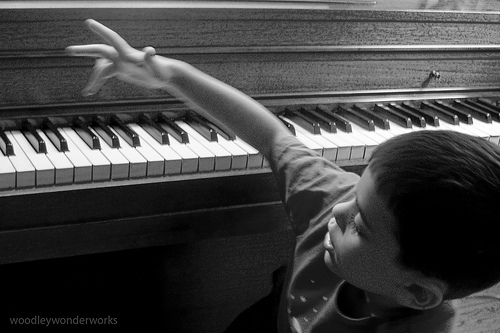You know, every once in awhile you stop and reflect on formative moments that helped to shape you into what you’ve become. I’m not really sure why but today I remembered a moment from my childhood that I found particularly significant and I thought I’d share it with you.
When I was a kid, my parents got me piano lessons. Since no child in my town who actually took piano lessons was exempt from competition, every year I was entered in the Kiwanis Festival where I would perform for a room full of strangers to take home various paper prizes (certificates – not money – I wish).
 I never really grew to enjoy the competition. Oh there were moments…my piano teacher secretly pitted me and another student against one another. She told me for years, “Cathy could do scales twice that fast a year younger than you. Cathy’s a better person. Cathy got to live in Paris. When Cathy shits her pants there’s peace in a third world country. Cathy, Cathy, Cathy.” It should come as no surprise that I despised her and delighted in beating her at every opportunity (Cathy if you’re out there reading this, confession time: my nickname for you was “Grimy” because it went so well with your surname).
I never really grew to enjoy the competition. Oh there were moments…my piano teacher secretly pitted me and another student against one another. She told me for years, “Cathy could do scales twice that fast a year younger than you. Cathy’s a better person. Cathy got to live in Paris. When Cathy shits her pants there’s peace in a third world country. Cathy, Cathy, Cathy.” It should come as no surprise that I despised her and delighted in beating her at every opportunity (Cathy if you’re out there reading this, confession time: my nickname for you was “Grimy” because it went so well with your surname).
Well, it turns out the whole time she was telling Cathy, “Geoff’s arpeggios are SO much more fluid than yours. Why can’t you be more like him? Geoff, Geoff, Geoff.” I know my teacher’s long dead now, and she was a nun, and you shouldn’t speak ill, but seriously: what a bitch!
Anyway, I digress. The very first year I went out for competition, I couldn’t have been more than 9 years old. In fact I think I was probably only 8. On one occasion that year, after I finished my performance and returned to my contestant’s chair, I made an exaggerated relieved face just as I sat down. Apparently the entire audience saw the face I made and they all started to laugh.
Well, I was horribly embarrassed. All these people were laughing at me. Had I been ten years older I’d’ve been looking for the bucket of pig blood over my head. My mother was in the audience that day, but it would be close to a half an hour before the competition ended and I could seek solace. So I had to sit there feeling embarrassed and ashamed that I inadvertently revealed an emotion to a room full of people and they thought it was funny. That was a really, really long half hour.
I received a lot of congratulations, and I believe an award of some kind. Many of the people in the audience made a point of coming up to tell me what I great performance I’d made. It was all very confusing. When I finally got to see my mom, I asked her why everybody laughed at me, and then were really nice to me. She said, “they weren’t laughing at you. They all knew exactly how you must have felt and they were just glad for you that you were done.”
It was that very moment, so like a Polaroid in my mind, that a light went on in my head. Everyone is afraid; everyone is vulnerable. And when you give others a glimpse of your own vulnerability, they can recognize that trait in themselves and offer unspoken support. It’s a crazy paradox: weakness actually makes you stronger through the sharing of it. That’s not to say it would have been okay if I’d given a crappy performance…I still had to do a good job. But knowing that I was a human being made the audience appreciate my performance all the more. It was kind of a big epiphany for an eight year-old (although this is the first time I’ve ever tried to articulate it).
As I grew into a professional, I never forgot that lesson. I don’t run around telling everybody how weak I am or complain about how hard my job is. But there are moments (and there are signs) where it’s exactly right to give others on your team a sneak look into your private relief, or trepidation, or cynicism. The result is an unspoken bond of recognition that results in far stronger support and loyalty than you could ever get through direct authority. Believe me–the loyalty of others is a very powerful thing, and it protects you during the times when you need it most. But loyalty – genuine loyalty – is not a right of your position, but a privilege that comes from giving others the gift of the real you.
I think if my mother had answered any other way, that moment would have been lost and I probably would have locked myself in my room and refused to come out until I was twelve. But she didn’t, and that particular value became a part of who I am.
Funny, the things you remember.
Incidentally, Cathy, if you’re out there, I don’t call you “Grimy” anymore.
